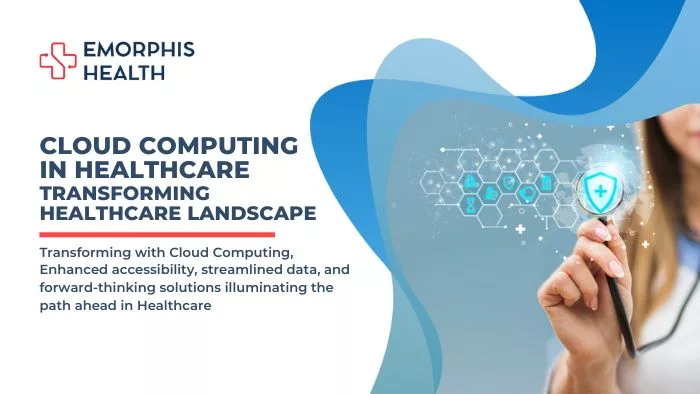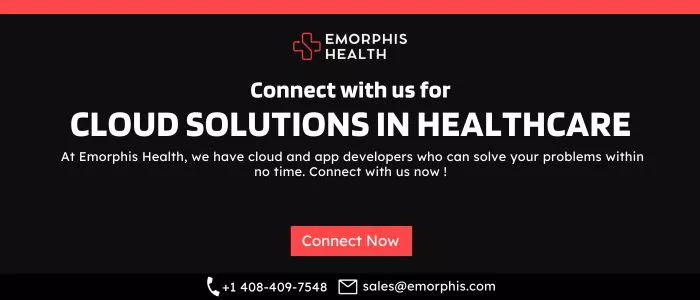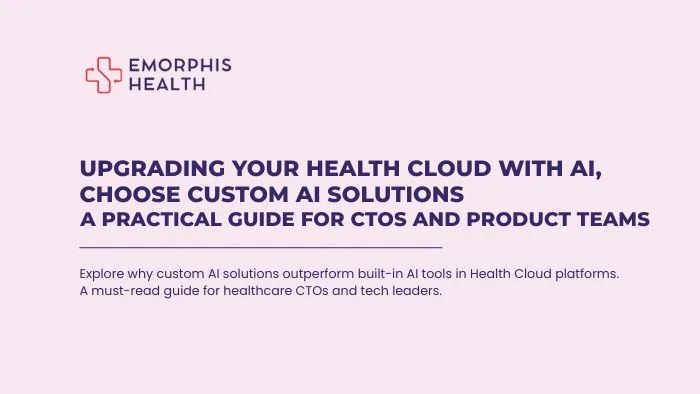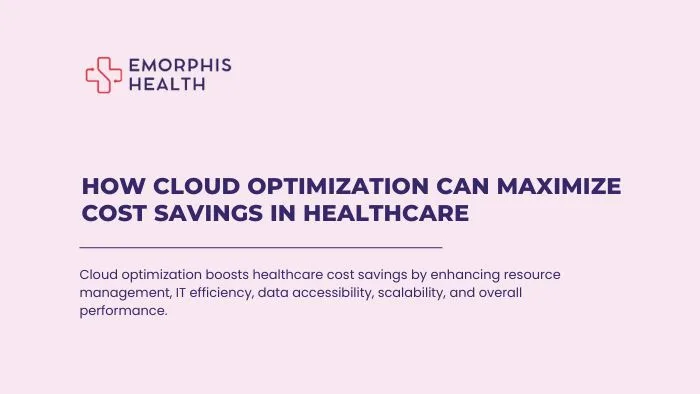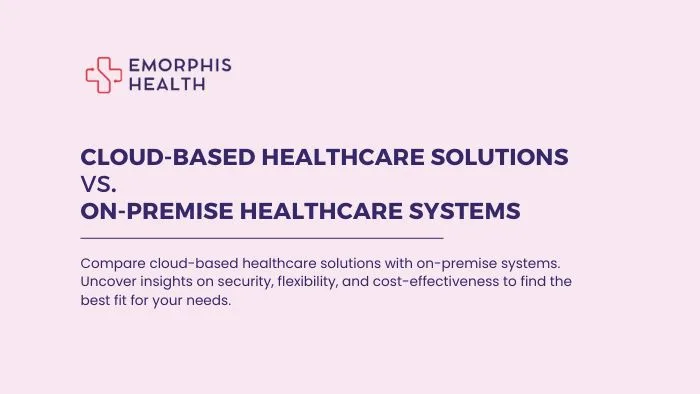Introduction to Cloud Computing in Healthcare
See Contents
Cloud computing has emerged as a transformative force in the healthcare landscape, reshaping the way medical services are delivered and managed. This technology’s integration into healthcare systems brings forth a paradigm shift, enabling healthcare professionals to harness the power of cloud-based solutions to enhance patient care, streamline operations, and accelerate medical advancements.
According to precedenceresearch.com report, the global healthcare cloud computing market exhibited remarkable growth, reaching a valuation of USD 35.61 billion in 2022, and is projected to surge to approximately USD 127.04 billion by 2030, with a notable compound annual growth rate (CAGR) of around 17.2% throughout the forecast period from 2022 to 2030. Notably, North America dominated the market, contributing 35.6% of the total revenue share in 2022, while the Asia Pacific region is poised for significant expansion with an anticipated CAGR of 21.8% from 2022 to 2030.
The healthcare provider solutions segment is experiencing robust growth at a CAGR of 21.4% during the same period. Moreover, the service model segment accounted for 47% of the revenue share in 2022, and the hospital end-use segment is projected to comprise 25% of revenue by 2030. The clinical information system segment is set to achieve a CAGR of 14.3% from 2022 to 2030.
Key Growth Factors
This growth is attributed to recent technological advancements and heightened security measures that have enabled healthcare institutions to harness the benefits of cloud computing. Innovations such as remote monitoring, natural language processing APIs, and telehealth technologies continue to evolve, adapting to emerging digital health landscapes.
A survey by HIMSS revealed that over 83% of healthcare organizations are now utilizing cloud services. Forward-looking healthcare facilities are integrating cutting-edge technology by processing and analyzing data at the point of collection rather than transferring it to the cloud. The proliferation of high-speed internet and favorable regulatory actions are expected to further drive the growth of the global healthcare cloud computing market.
According to grandviewresearch.com report, the global healthcare cloud infrastructure market has shown robust growth, reaching a value of USD 56.3 billion in 2022. This upward trajectory is projected to continue, with an expected compound annual growth rate (CAGR) of 16.7% from 2023 to 2030.
The surge in demand is fueled by the increasing digitalization of healthcare, the incorporation of advanced AI/ML algorithms, cloud-based deployment of healthcare systems, escalating expenditures, operational inefficiencies, and overburdened healthcare systems. This heightened demand is driving care facilities to seek healthcare cloud infrastructure solutions to streamline workflows, enhance operational outcomes, fortify data management and security, and ultimately deliver optimal care.
This trend is poised to further stimulate adoption and demand for cloud infrastructure systems, contributing to substantial market growth.
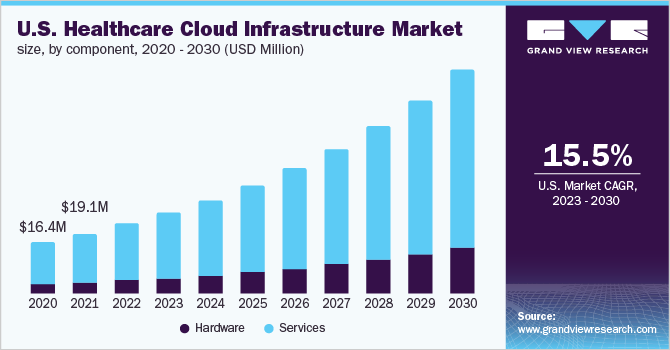

In the dynamic healthcare cloud infrastructure market, key players are consistently focusing on innovation and the development of advanced products and solutions.
Additionally, they are offering comprehensive services such as pre-implementation support and user training. These industry leaders are strategically devising collaboration strategies to expand their offerings, with a particular emphasis on catering to larger clientele in developing nations.
Latest Updates
For instance, in February 2022, Lyniate acquired SAP SE, aiming to provide technology and management consulting expertise. This move assists clients in adopting a hybrid cloud framework and transitioning critical workflows from SAP solutions to the cloud for both regulated and non-regulated businesses.
Similarly, IBM’s acquisition of Neudesic, LLC in the same month serves to enhance IBM’s portfolio of hybrid multi-cloud services and further its hybrid cloud and AI strategy. Prominent players in the global healthcare cloud infrastructure market include Dell, Hewlett-Packard Enterprise, Microsoft, Oracle, IBM, Salesforce, and Amazon.
According to mordorintelligence.com report, in November 2022, a strategic collaboration unfolded as Wipro Ltd joined forces with VMware, a cloud computing service provider based in the United States. In this alliance, Wipro is establishing and maintaining a dedicated VMware business unit, with the aim of providing its clientele with VMware’s platform as a service offering. The initiative encompasses a comprehensive training effort, with Wipro endeavoring to upskill up to 5,000 professionals in VMware’s versatile cross-cloud services.
In the realm of digital transformation, June 2022 witnessed a significant stride as Saudi Arabia’s Ministry of Health (MoH) orchestrated the deployment of VMware’s multi-cloud solutions. The strategic implementation of these solutions marks a pivotal shift in the country’s public healthcare sector, infusing it with digital prowess.
The impact is profound: the Ministry, by virtue of this deployment, is now positioned to deliver secure, cloud-based services to an extensive network of public healthcare providers encompassing hospitals, clinics, and pharmacies. This transformative move not only amplifies the efficiency of these entities but also lays the foundation for their expansion and innovation, thus ushering in a new era of digital healthcare capabilities within Saudi Arabia.
Generative AI and Healthcare Cloud Computing
Recently generative AI has been trending. Generative AI and healthcare cloud computing are converging, forming a dynamic partnership that propels transformative advancements within the healthcare industry. In fact, Generative AI, which falls under the umbrella of artificial intelligence, empowers machines to generate data with striking resemblances to human-generated content. Also, this cutting-edge technology finds a harmonious union with healthcare cloud computing. Moreover resulting in a synergy that brings forth revolutionary outcomes. In fact, one prominent application of this synergy is observed in the realm of medical image analysis. It is where generative AI’s capabilities enhance the precision of diagnoses through lifelike simulations and also predictive modeling.
Furthermore, the integration of generative AI with healthcare cloud computing leverages the computational prowess of the cloud to process extensive datasets. In fact, this amalgamation empowers healthcare providers to not only refine AI models but also to analyze vast amounts of patient information. Which ultimately culminates in the delivery of personalized treatment plans. As generative AI and healthcare cloud computing converge, the field of precision medicine is propelled to new horizons, clinical workflows are streamlined, and also patient care is elevated to unprecedented levels of excellence.
Click the link to check the top use cases of Generative AI in Healthcare
Benefits of Cloud Computing in Healthcare
Cloud computing brings a multitude of advantages to the healthcare sector, also revolutionizing the way medical services are provided and managed.
A. Scalability and Flexibility for Healthcare Systems
Cloud technology empowers healthcare organizations to scale their operations seamlessly. In fact, it allows for the dynamic allocation of resources, accommodating fluctuations in patient demand, and enabling rapid expansion without cumbersome infrastructure changes.
B. Enhanced Data Security and Privacy Measures
Cloud solutions offer robust security features, ensuring the protection of sensitive patient information. Advanced encryption, access controls, and also compliance mechanisms bolster data security, safeguarding patient privacy and complying with regulatory standards.
C. Cost-Efficiency and Resource Optimization
Cloud adoption alleviates the burden of maintaining and also upgrading on-premises infrastructure, reducing capital expenditures. Pay-as-you-go models allow healthcare institutions to optimize costs, allocate resources efficiently, and also invest in innovative healthcare initiatives.
D. Streamlined Collaboration and Data Accessibility
Cloud-enabled platforms facilitate seamless information exchange and collaboration among healthcare professionals across different locations. Real-time access to patient records and medical data enhances care coordination, leading to quicker diagnoses and also informed treatment decisions.
E. Disaster Recovery and Business Continuity
Cloud-based backup and recovery solutions ensure data resilience in the face of disruptions. Moreover, healthcare organizations can recover quickly from data loss incidents, ensuring uninterrupted patient care and operational continuity.
F. Innovative Medical Research and Analytics
Cloud computing accelerates medical research by providing the computational power needed for data-intensive tasks like genomic analysis and also drug discovery. In fact, researchers can leverage cloud resources to derive insights from large datasets, driving advancements in medical science.
G. Telemedicine and Remote Patient Care
Cloud-based telemedicine platforms enable remote consultations, allowing patients to receive medical attention from the comfort of their homes. Also, cloud technology facilitates virtual care delivery, expanding healthcare access to remote and underserved areas.
Check our Remote patient monitoring software development services
H. Empowering Patient Engagement and Personalized Care
Cloud solutions support patient portals and mobile apps, empowering individuals to access their health records, schedule appointments, and engage in their care plans. Personalized treatment recommendations can be derived from analyzing patient data stored in the cloud.
Understanding Cloud Solutions in Healthcare
In the realm of healthcare, comprehending the intricacies of cloud solutions is paramount. These solutions represent a technological revolution that is reshaping how medical services are conceived and provided.
“Cloud Computing in Healthcare” generally refers to the overarching concept of using cloud technology and computing resources to improve various aspects of healthcare, such as data management, analytics, telemedicine, and more.
“Cloud Solutions in Healthcare” narrows the focus to specific applications and solutions that leverage cloud computing to address healthcare challenges and improve patient care. This includes areas like electronic health records, telemedicine platforms, health information exchange, and more.
So, while they are related, the terms are not synonymous but rather represent different levels of specificity within the broader theme of cloud technology in healthcare.
Cloud-based innovations seamlessly integrate with healthcare practices, offering a flexible and dynamic platform for data management, analysis, and collaboration. As we delve deeper into this topic, a comprehensive understanding of the transformative potential of cloud solutions in healthcare unfolds.
Types of Cloud Solutions Redefining Healthcare Delivery
Within the landscape of healthcare delivery, a dynamic transformation is being driven by various types of cloud solutions. In fact, these innovative approaches are fundamentally reshaping how healthcare services are administered, revolutionizing patient care models, and streamlining operational workflows.
The diverse array of cloud solutions, including Infrastructure as a Service (IaaS), Platform as a Service (PaaS), and Software as a Service (SaaS), play distinct roles in this evolution.
IaaS empowers healthcare institutions with scalable and flexible infrastructure, swiftly adapting to fluctuating demands.
PaaS fosters an environment for developers to create and deploy applications tailored to specific healthcare needs.
SaaS brings ready-to-use software applications, enhancing efficiency in tasks such as electronic health record (EHR) management and telemedicine implementation.
These cloud-driven shifts in healthcare delivery harmonize with the fast-paced demands of the industry, optimizing patient outcomes, elevating collaborative efforts, and catalyzing continuous innovation.
1. Cloud-Powered Electronic Health Records (EHR) Systems
Modernizing Patient Data Management and Accessibility
In the realm of healthcare, cloud-powered Electronic Health Records (EHR) systems are modernizing the landscape of patient data management and accessibility. Cloud technology enables real-time updates and seamless information retrieval. In fact, revolutionizing how medical data is stored and accessed. This transformation enhances the efficiency of healthcare processes and empowers medical professionals with instant access to comprehensive patient records.
Enhancing Interoperability and Secure Health Information Exchange
Cloud solutions are driving enhanced interoperability and secure health information exchange across healthcare systems. By facilitating seamless communication between disparate entities. The Cloud-enabled EHR systems ensure that patient data is accessible when and where it is needed. The cloud’s robust security features, including encryption and access controls, safeguard the integrity of health information during the exchange, promoting collaboration while upholding data privacy.
Get more details with our EHR and EMR development and integration services
2. Telemedicine and Virtual Care: Cloud’s Role in Remote Healthcare
Enabling Seamless Virtual Consultations and Telehealth Services
Cloud technology is reshaping the landscape of remote healthcare through telemedicine and virtual care solutions. As a matter of fact, the cloud’s integration enables seamless virtual consultations, transcending geographical barriers and providing patients with immediate access to medical expertise. In fact, this cloud-enabled approach facilitates timely diagnoses, treatment recommendations, and ongoing patient-provider interactions.
Bridging Geographical Gaps through Cloud-Connected Care
Cloud solutions play a pivotal role in bridging geographical gaps, making healthcare accessible to remote and underserved areas. In fact, through cloud-connected care, patients can receive quality medical services regardless of their location. Also, cloud technology empowers healthcare providers to deliver virtual consultations, diagnostics, and treatment plans, ensuring equitable access to healthcare services.
Connect with us for Telemedicine app development solutions
3. Health Information Exchange (HIE) Platforms: Facilitating Collaborative Care
Breaking Down Data Barriers for Efficient Medical Data Sharing
Health Information Exchange (HIE) platforms, empowered by cloud technology, break down data barriers in healthcare. These platforms enable seamless sharing of medical data among different healthcare entities, also fostering collaborative care delivery. Moreover, cloud solutions facilitate the secure and efficient exchange of patient information, enabling comprehensive and well-coordinated treatments.
Strengthening Cross-Institutional Care Coordination via Cloud Solutions
Cloud solutions strengthen cross-institutional care coordination by providing a unified platform for healthcare teams to collaborate. The cloud’s integration also allows medical professionals from various institutions to access and share critical patient insights, enabling more informed and collaborative decision-making. Cloud-enabled HIE platforms enhance the continuity and quality of patient care across different healthcare settings.
Also, look for more details on Health Information exchange and get in touch for healthcare integration services
5. Advanced Imaging and Diagnostics: Cloud-Enabled Medical Visualizations
Transforming Diagnoses with Cloud-Based Imaging and Analytics
The integration of cloud technology into advanced imaging and diagnostics is transforming medical diagnoses. In fact, Cloud-enabled solutions enhance the visualization and analysis of medical images, enabling healthcare professionals to make more accurate and timely diagnoses. Also, cloud-based analytics provide real-time insights, supporting precise treatment planning and patient care.
Enabling Multidisciplinary Collaboration for Enhanced Patient Care
Cloud-enabled medical visualizations foster multidisciplinary collaboration among healthcare specialists. As a matter of fact, the cloud’s collaborative capabilities enable specialists to collectively analyze medical images, regardless of their physical location. Cloud technology enhances communication and knowledge-sharing among different medical disciplines, in fact, resulting in comprehensive and well-informed patient care decisions.
6. Leveraging Cloud Analytics for Healthcare Insights
Harnessing Big Data Analytics to Revolutionize Healthcare Decision-Making
The harnessing of big data analytics through cloud technology is revolutionizing healthcare decision-making. Cloud solutions enable healthcare professionals to process and analyze vast datasets, extracting meaningful insights that inform clinical and operational strategies. By leveraging cloud analytics, healthcare organizations can make data-driven decisions to improve patient care outcomes and optimize resource allocation.
Predictive Analytics for Improving Patient Outcomes and Resource Allocation
Predictive analytics, a hallmark of cloud-enabled healthcare, empowers proactive patient care strategies. Through cloud-driven predictive analytics, healthcare providers can anticipate health trends and potential risks, enabling timely interventions and resource allocation. Cloud technology enables healthcare professionals to optimize patient outcomes and allocate resources efficiently for enhanced healthcare delivery.
Recommend reading – How Healthcare Analytics Software Helps in Critical Decision-Making?
7. Genomic Research and Precision Medicine: Cloud’s Genetic Advancements
Accelerating Genomic Discoveries through Cloud Computing
Cloud computing is accelerating genomic research by providing the computational power required for complex genetic analyses. Cloud-powered tools enable researchers to process and analyze vast genomic datasets, expediting the discovery of genetic insights. The cloud’s scalability and efficiency are driving advancements in precision medicine, enabling tailored treatment approaches based on individual genetic profiles.
Personalized Treatment Strategies Driven by Cloud-Powered Genomic Insights
Cloud-powered genomic insights are revolutionizing personalized treatment strategies in healthcare. By analyzing individual genetic data, healthcare providers can develop targeted interventions that maximize treatment efficacy and patient well-being. Cloud technology empowers precision medicine, enabling healthcare professionals to tailor medical approaches based on a patient’s unique genetic makeup.
8. Clinical Trials Optimization with Cloud Solutions
Revolutionizing Clinical Trials Management and Data Handling
Cloud solutions are revolutionizing the management and data-handling processes of clinical trials. The cloud’s scalability and collaborative features facilitate data sharing and analysis among researchers, expediting the research process. Cloud-enabled clinical trials optimize resource allocation, enhance research integrity, and accelerate the advancement of medical breakthroughs.
Enhancing Research Integrity and Accelerating Medical Breakthroughs
Cloud-driven clinical trials enhance research integrity by ensuring data accuracy, security, and accessibility. The cloud’s collaborative environment enables researchers to collaborate across geographical boundaries, pool resources, and collectively drive medical breakthroughs. Cloud technology accelerates the research timeline, fostering a collaborative and efficient approach to advancing healthcare knowledge.
9. Efficiency in Supply Chain Management: Cloud-Enhanced Inventory Solutions
Ensuring Timely Access to Critical Medical Supplies through Cloud Innovations
Cloud-enhanced supply chain management ensures the timely availability of critical medical supplies. Cloud-driven inventory solutions optimize supply logistics, minimizing shortages and ensuring that healthcare providers have access to essential resources when needed. Cloud technology enhances the efficiency of supply chain operations, contributing to uninterrupted healthcare services.
Reducing Costs and Minimizing Shortages with Cloud-Driven Logistics
Cloud-enabled logistics reduce costs and minimize shortages in healthcare supply chains. The cloud’s real-time visibility and predictive analytics empower supply chain managers to optimize inventory levels, streamline procurement processes, and also ensure the timely delivery of medical supplies. Cloud-driven logistics enhance healthcare organizations’ ability to manage resources efficiently and in fact, reduce operational costs.
10. Empowering Patients through Cloud-Connected Engagement
Fostering Patient Empowerment and Active Participation in Healthcare
Cloud-connected engagement empowers patients to take an active role in managing their health and well-being. Cloud-enabled apps and platforms also provide individuals with real-time access to their health data, enabling them to track progress, set goals, and make informed decisions about their healthcare journey. This empowerment, in fact, enhances patient engagement, leading to better health outcomes and a more collaborative patient-provider relationship.
Real-Time Monitoring and Self-Management Enabled by Cloud-Enabled Apps
Cloud-enabled apps facilitate real-time monitoring and self-management of health conditions. In fact, patients can use cloud-connected devices to track vital signs, receive medication reminders, and communicate with healthcare providers remotely. The cloud’s accessibility and connectivity enhance patients’ ability to manage their health proactively, also promoting self-care and early intervention.
Future Trends and Innovations in Cloud-Enabled Healthcare
i. Emerging technologies like edge computing and 5G in healthcare
The future of cloud-enabled healthcare is shaped by emerging technologies such as edge computing and 5G connectivity. These technologies enhance data processing speed, also enable real-time communication, and support the seamless integration of medical devices and wearable technologies. The combination of cloud computing, edge computing, and 5G is ready to revolutionize healthcare delivery. In fact, enhancing patient care and expanding healthcare access.
ii. Anticipating Next-Generation Cloud Solutions for Evolving Healthcare Needs
Next-generation cloud solutions are going to address the evolving needs of the healthcare industry. These solutions will focus on scalability, interoperability, and also data security, catering to the increasing demands of digital healthcare. The integration of artificial intelligence, machine learning, and blockchain into cloud-enabled healthcare is expected to drive further innovation. Moreover, transform how medical services are provided and accessed.
iii. Predictions for the evolution of cloud computing’s role in the medical field
The evolution of cloud computing’s role in the medical field is going to have continuous advancements and transformative shifts. Cloud solutions will play an instrumental role in enabling personalized medicine, improving patient engagement, and facilitating remote healthcare delivery. As cloud technology continues to evolve, it will empower healthcare professionals to make data-driven decisions, also enhance patient care outcomes, and shape the future of healthcare through innovation and collaboration.
Conclusion
In conclusion, the synergy between cloud computing and healthcare is undeniably shaping a profound revolution in the landscape of medical services. In fact, cloud-powered solutions have emerged as the catalysts for transformation across various healthcare facets, spanning electronic health records, telemedicine, genomics research, clinical trials, and patient engagement. As we reflect on the intricate interplay between cloud technology and healthcare, it becomes evident that this fusion embodies unparalleled potential.
By integrating cloud technology, healthcare systems attain a new level of efficiency, bolstered accessibility, and also a collaborative framework among healthcare providers. This, in turn, culminates in improved patient outcomes and heightened care coordination, in fact, bringing a ripple effect of positive change throughout the healthcare continuum. As the healthcare sector evolves into a more digitally-driven era, the significance of cloud solutions also becomes increasingly paramount. In fact, these solutions serve as the bedrock upon which the future of healthcare is going forward. A future characterized by precision medicine, data-enabled decision-making, and also innovative pedagogical approaches.
For those keen to harness the vast transformative opportunities that cloud computing holds for healthcare, there stands an eminent partner – Emorphis Technologies.
With an illustrious track record of delivering cutting-edge cloud solutions, Emorphis Technologies can guide healthcare organizations through this transformative journey. By leveraging the expertise, healthcare entities can also seamlessly design, implement, and optimize bespoke cloud-based systems tailored to their distinct requirements.
The profound potential of cloud computing in healthcare awaits, and the doorway to this potential lies through a partnership with Emorphis Technologies. Connect with us today to embark on a transformative expedition that also promises to reshape the healthcare landscape for the better.

